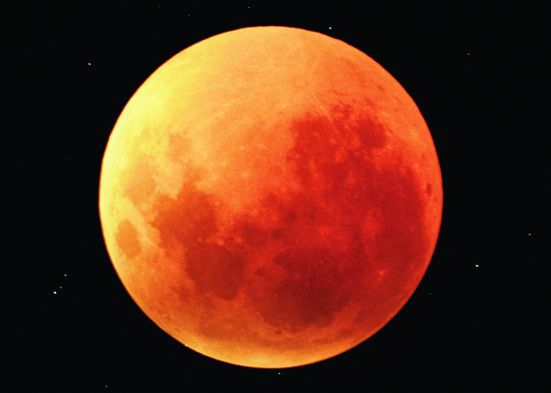
|
Credit & Copyright: Noel Munford
(Palmerston North Astronomical Society, New Zealand)
Explanation:
As the Moon passed almost directly through the center
of Earth's shadow on July 16th,
sky
gazers in the
Pacific hemisphere were graced by a
lingering lunar eclipse.
The total phase lasted 1 hour and 47 minutes, the
longest since 1859.
A longer total lunar eclipse won't occur until
the year 3000.
Taking advantage of the
lengthy
totality, astronomer and photographer,
Noel Munford used a small telescope to
record this colourful picture of the
eclipsed Moon and nearby
stars in the skies above Palmerston North,
New Zealand.
Near the top in this
southern
hemisphere perspective
is the 84 kilometer wide bright ray crater Tycho.
The Moon
looks red even when it lies completely in
shadow because it is still illuminated by sunlight reddened by dust
and refracted by the atmosphere along the Earth's limb.
Changes in atmospheric dust content mean that
each eclipse can have a different appearance.
An experienced observer, Munford comments that at mid totality
this eclipse had a more uniform, delicate, subtle colour and
was one of the lightest he has seen.
|
January February March April May June July August September October November December |
| |||||||||||||||||||||||||||||||||||||||||||||||||||||||
NASA Web Site Statements, Warnings, and Disclaimers
NASA Official: Jay Norris. Specific rights apply.
A service of: LHEA at NASA / GSFC
& Michigan Tech. U.
Based on Astronomy Picture
Of the Day
Publications with keywords: eclipse - lunar eclipse
Publications with words: eclipse - lunar eclipse
See also:
